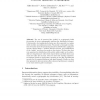Free Online Productivity Tools
i2Speak
i2Symbol
i2OCR
iTex2Img
iWeb2Print
iWeb2Shot
i2Type
iPdf2Split
iPdf2Merge
i2Bopomofo
i2Arabic
i2Style
i2Image
i2PDF
iLatex2Rtf
Sci2ools
125
click to vote
EUROCRYPT
2000
Springer
2000
Springer
Security Aspects of Practical Quantum Cryptography
The use of quantum bits (qubits) in cryptography holds the promise of secure cryptographic quantum key distribution schemes. Unfortunately, the implemented schemes are often operated in a regime which excludes unconditional security. We provide a thorough investigation of security issues for practical quantum key distribution, taking into account channel losses, a realistic detection process, and modifications of the "qubits" sent from the sender to the receiver. We first show that even quantum key distribution with perfect qubits might not be achievable over long distances when fixed channel losses and fixed dark count errors are taken into account. Then we show that existing experimental schemes (based on weak pulses) currently do not offer unconditional security for the reported distances and signal strength. Finally we show that parametric downconversion offers enhanced performance compared to its weak coherent pulse counterpart.
Cryptology | EUROCRYPT 2000 | Key Distribution Schemes | Quantum Key Distribution | Unconditional Security |
Related Content
| Added | 24 Aug 2010 |
| Updated | 24 Aug 2010 |
| Type | Conference |
| Year | 2000 |
| Where | EUROCRYPT |
| Authors | Gilles Brassard, Norbert Lütkenhaus, Tal Mor, Barry C. Sanders |
Comments (0)

